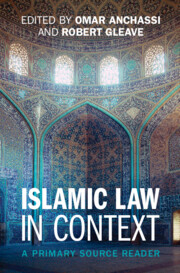Book contents
- Islamic Law in Context
- Islamic Law in Context
- Copyright page
- Contents
- Acknowledgements
- Contributors
- Introduction
- Part I Islamic Legal Theory (Uṣūl al-Fiqh) and Related Genres
- Part II Islamic Jurisprudence (Fiqh) and Related Genres
- Part III Legal Opinions (Fatwās)
- Chapter 17 Introduction to Part III
- Chapter 18 Ottoman Fatwās on the Substitution of Defunct Endowment Properties, from al-Aqwāl al-Marḍiyya of Qāḍīzādah Muḥammad Ṭāhir (d. 1254/1834)
- Chapter 19 Settling Disputes among Nomads
- Chapter 20 Fatwās on Aspects of Modern Life
- Chapter 21 ‘According to the Qaul Muʿtamad it is Unlawful and Invalid’
- Chapter 22 An Online Fatwā from the Dār al-Iftāʾ al-Miṣriyya on Women’s Leadership
- Chapter 23 ‘His Doctrine is Deviant’
- Part IV Court Judgments and Other Court Documentation
- Part V Judicial Manuals and Reference Books
- Part VI Alternative Sources for Islamic Legal Studies
- Name Index
- Subject Index
- References
Chapter 20 - Fatwās on Aspects of Modern Life
Drinking Pepsi (and Coke), Smoking Tobacco (and Other Things), from Fatāwā al-Imām al-Shaykh Bayyūḍ of Ibrāhīm Bayyūḍ (d. 1401/1981)
from Part III - Legal Opinions (Fatwās)
Published online by Cambridge University Press: 14 November 2024
- Islamic Law in Context
- Islamic Law in Context
- Copyright page
- Contents
- Acknowledgements
- Contributors
- Introduction
- Part I Islamic Legal Theory (Uṣūl al-Fiqh) and Related Genres
- Part II Islamic Jurisprudence (Fiqh) and Related Genres
- Part III Legal Opinions (Fatwās)
- Chapter 17 Introduction to Part III
- Chapter 18 Ottoman Fatwās on the Substitution of Defunct Endowment Properties, from al-Aqwāl al-Marḍiyya of Qāḍīzādah Muḥammad Ṭāhir (d. 1254/1834)
- Chapter 19 Settling Disputes among Nomads
- Chapter 20 Fatwās on Aspects of Modern Life
- Chapter 21 ‘According to the Qaul Muʿtamad it is Unlawful and Invalid’
- Chapter 22 An Online Fatwā from the Dār al-Iftāʾ al-Miṣriyya on Women’s Leadership
- Chapter 23 ‘His Doctrine is Deviant’
- Part IV Court Judgments and Other Court Documentation
- Part V Judicial Manuals and Reference Books
- Part VI Alternative Sources for Islamic Legal Studies
- Name Index
- Subject Index
- References
Summary
This chapter explores several legal opinions (pl. fatāwa) from the minority theological and legal tradition known as Ibāḍism, as represented by the work of the modern Ibāḍī jurist Ibrāhīm Bayyūḍ (d. 1401/1981). The Ibāḍiyya are usually regarded as the inheritors of the early Khārijite movement and are thus neither Sunnī nor Shīʿī. Important Ibāḍī communities are today found in Oman and in smaller numbers in North Africa (Jerba Island in Tunisia, the Jabal Nafūsa mountains of Libya and the M’zab valley in Algeria). Ibrāhīm Bayyūḍ was the most prominent figure of the so-called ‘Ibāḍī Rennaisance’ (al-Nahḍa al-Ibāḍiyya) of the late 19th and 20th centuries, in which the Ibāḍī community in M’zab sought to find a place for themselves in their Sunnī-dominated environment, leading to an upsurge of Ibāḍī legal and theological scholarship. The fatwās excerpted here discuss the lawfulness of television and radio, eating the meat of non-Muslims, Pepsi and Coca Cola, smoking and various drugs.
Keywords
- Type
- Chapter
- Information
- Islamic Law in ContextA Primary Source Reader, pp. 214 - 222Publisher: Cambridge University PressPrint publication year: 2024

